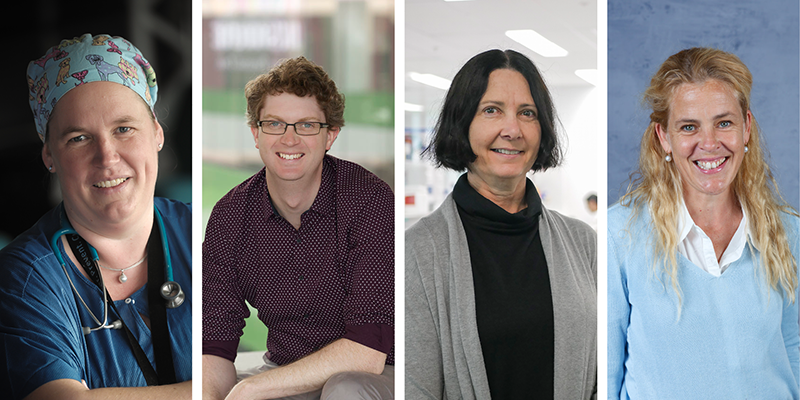Search
Research
Pediatric Endotracheal Tube Cuff Management at Altitude: Implications for Aeromedical Retrieval and Other Austere EnvironmentsChildren are sometimes transported via fixed or rotary wing aircraft for medical care. If they are intubated with a cuffed endotracheal tube (ETT), changes in environmental pressure during transport can alter cuff pressure. Cuff management in this setting varies widely by region and by organization. In this historical review, we sought to delineate the evolution of ETT cuff management in children undergoing aeromedical retrieval in order to progress the field toward an optimum strategy in the future.

News & Events
Inaugural Byron Kakulas medal awarded to Perioperative Medicine TeamA research team dedicated to making anaesthesia and surgery safer and more comfortable for babies and children has been awarded an inaugural Byron Kakulas Medal by WA’s Perron Institute.

News & Events
Funding boost to help turn research into practical changeResearch projects sharing in a $2.1 million funding boost will seek to translate research findings into changes that benefit patients and help the health system run more efficiently.
Research
Behavioural and neuropsychological outcomes in children exposed in utero to maternal labour epidural analgesiaRecent studies report conflicting results regarding the relationship between labour epidural analgesia (LEA) in mothers and neurodevelopmental disorders in their offspring. We evaluated behavioural and neuropsychological test scores in children of mothers who used LEA.
Research
Numerical simulation of aerosolised medicine delivery through tracheostomy airwaysThe administration of inhaled antibiotics to patients with upper or lower respiratory infections is sometimes conducted via a tracheostomy airway. However, precise dosing via this route remains uncertain, especially in spontaneously breathing paediatric patients.
Research
Feasibility of the pre-operative measurement of fractional exhaled nitric oxide and respiratory mechanics to predict respiratory outcomes in children undergoing general anaesthesiaPeri-operative respiratory adverse events remain a major cause of morbidity and mortality in children undergoing general anaesthesia; those with asthma are at higher risk. The aim of this feasibility study was to determine whether pre-operative measurements of fractional exhaled nitric oxide and the forced oscillation technique are feasible in children, and to explore whether these measurements can predict peri-operative respiratory adverse events.
Research
Topical Lidocaine During Airway Manipulation in Pediatric Anesthesia: A Systematic Review and Meta-AnalysisLidocaine is widely used in pediatric anesthesia for airway topicalization to modulate undesirable airway and circulatory reflexes, yet its effectiveness remains unclear. Therefore, we aimed to perform a meta-analysis evaluating the impact of topical lidocaine on respiratory adverse events in children undergoing airway management.
Research
Pain and recovery profiles following common orthopaedic surgeries in childrenLittle evidence exists on the postoperative trajectory after paediatric orthopaedic surgery. Pain and behavioural disturbance can have short- and long-term impacts on children and their families. An improved understanding of procedure-specific postoperative trajectories can enhance recovery. The primary outcome was to examine the duration and severity of postoperative pain experienced by children undergoing 10 commonly performed orthopaedic procedures.
Research
Association of preoperative nocturnal hypoxaemia nadir and fentanyl ventilatory sensitivity in children with obstructive sleep apnoea undergoing general anaesthesiaObstructive sleep apnoea (OSA) has been thought to increase the risk of respiratory depression from opioids. The primary aim of this study was to assess whether preoperative hypoxaemia by sleep study pulse oximetry imparts greater opioid sensitivity.
Research
Current post-tonsillectomy analgesia practices among Australian and New Zealand anesthetists, and opinions on non-opioid alternativesChildren experience significant pain following extracapsular tonsillectomy surgery, and while opioids are often prescribed to treat this, clinicians may be wary of their adverse side effects, leading to variation in practice. There is a need for improved post-tonsillectomy pain management in children.
